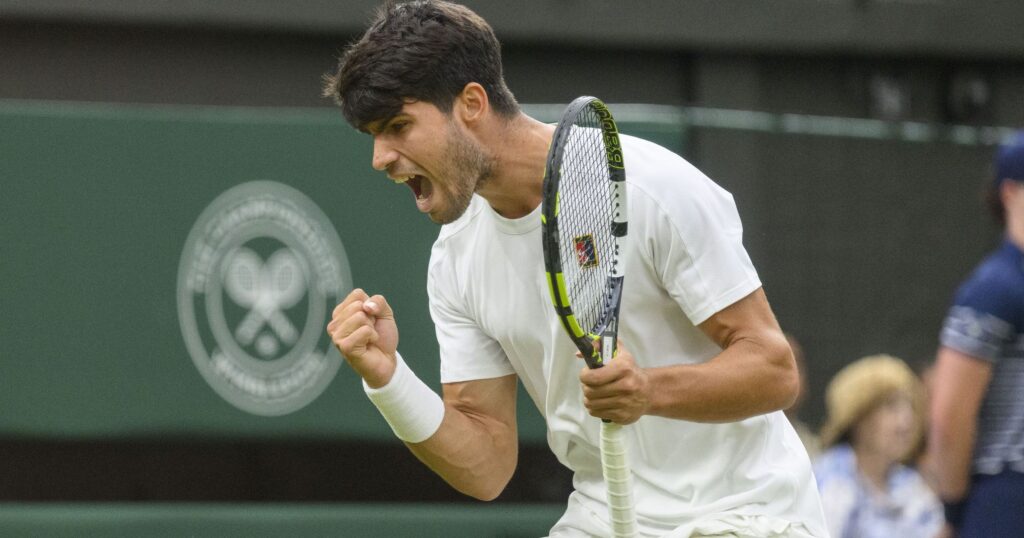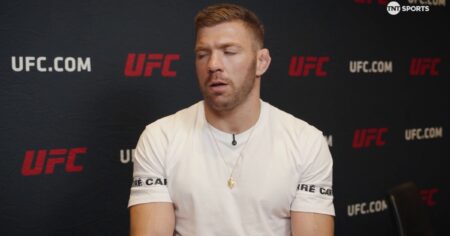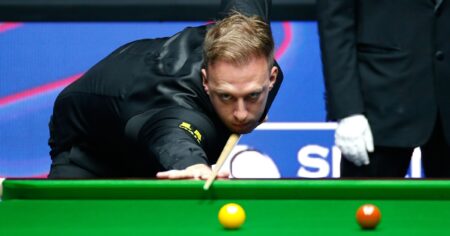Defending champion Carlos Alcaraz demonstrated remarkable mental fortitude as he successfully battled back from a set down to defeat Andrey Rublev and secure his place in the quarter-finals of Wimbledon. This match was a notable challenge for Alcaraz, marking the first time he had found himself trailing in a match since his exhilarating victory over Jannik Sinner in the French Open final just a month prior. Eventually, Alcaraz notched a 6-7(5) 6-3 6-4 6-4 victory, showcasing his resilience amid adversity.
After the match concluded, Alcaraz provided insights into his strategic mindset while facing a deficit. He emphasized the importance of self-belief, stating, “It is just about belief in yourself. It doesn’t matter if you are set down.” This philosophy underlines a crucial aspect of competitive sports—confidence can be transformative. Alcaraz elaborated that “Tennis can change in one point,” highlighting how quickly the dynamics of a match can shift, reinforcing why maintaining mental strength is vital during play. He acknowledged that his turn-around in the match was facilitated by staying focused and seizing opportunities presented by Rublev, notably the pivotal break he achieved in the second set.
On the other side of the net, Rublev appeared assured and revitalized on the grass courts, a transformation credited to his recent collaboration with Marat Safin, a two-time Grand Slam champion. Rublev’s psychological struggles, which he has been candid about in the past, seemed to diminish as he showcased a level of play that had the potential to upset the defending champion. He initially broke Alcaraz’s serve, catching the young Spaniard off guard, demonstrating not just power, but finesse that kept the match entertaining.
Despite a strong start, Rublev’s lead slipped away during a tense first set. Alcaraz, although initially struggling with his rhythm punctuated by a few mishits, found his footing to secure a break point against Rublev. However, it was Rublev who took the first set after gaining a crucial mini-break in the tiebreaker. Alcaraz, respecting his opponent’s prowess, described Rublev as “one of the most powerful, if not the most powerful, player on tour,” noting the intensity he brings to each rally. Following the first set, Alcaraz shifted gears—showcasing the incredible athleticism and tactical acumen that has defined his rise in the tennis world.
As the second set commenced, Alcaraz’s performance took a turn. He engineered a break that significantly altered the momentum of the match, evidencing his ability to respond under pressure. Displaying controlled aggression and keen tactical choices, Alcaraz quickly moved to level the match, and the once-trailing player was back in formidable form, breaking Rublev’s serve again and maintaining pressure throughout.
Throughout the match, Rublev remained a formidable opponent but encountered lapses at critical junctures. These moments of inconsistency opened up windows for Alcaraz, who displayed exceptional serving, keeping his opponent at bay after overcoming a challenging first set. Ultimately, Alcaraz capitalized on the slightest openings, advancing his game to pull away decisively in the closing phases of the match.
Ultimately, Alcaraz sealed the match with relative authority, drawing energy and support from the crowd that appreciated the young Spaniard’s commitment to entertainment and sportsmanship on the hallowed grounds of Wimbledon. In his post-match comments, Alcaraz reflected on his love for playing at Wimbledon, terming each appearance on the iconic grass courts a privilege. Looking ahead, he acknowledged the challenge posed by his next opponent, potentially signaling the high stakes that lie ahead in this prestigious tournament. “It will be really difficult. Cam is playing great, I know him well. It will be interesting, but I’m just excited about playing a quarter-final here,” he remarked, indicating not only respect but also enthusiasm for the challenges yet to come.
In conclusion, Carlos Alcaraz’s performance against Andrey Rublev underscored the power of resilience and mental strength in competitive sports. The Swedish player’s ability to adapt and evolve, even while facing tough opposition, cements his status as one of tennis’s rising stars, poised for continued success on the grand stage.












